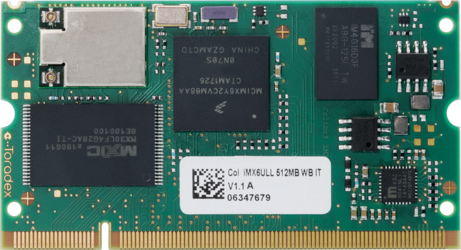The official Mender documentation explains how Mender works. This is simply a board-specific complement to the official documentation.
Board description
The Colibri i.MX6ULL is a System on Module based on the NXP® i.MX 6ULL family of embedded System on Chips (SoCs). The i.MX 6ULL is a power efficient and cost-optimized applications processor family featuring an advanced implementation of a single Arm Cortex-A7 core, which operates at speeds up to 900 MHz. The i.MX 6ULL applications processor includes an integrated power management module that reduces the complexity of an external power supply and simplifies power sequencing. Each processor in this family provides various memory interfaces, including 16-bit LPDDR2, DDR3, DDR3L, raw and managed NAND flash, NOR flash, eMMC, Quad SPI and a wide range of other interfaces for connecting peripherals such as WLAN, Bluetooth®, GPS, displays and camera sensors.

URL: https://www.toradex.com/computer-on-modules/colibri-arm-family/nxp-imx6ull
Wiki: Colibri iMX6ULL | Toradex Developer Center
Test results
The Yocto Project releases in the table below have been tested by the Mender community. Please update it if you have tested this integration on other Yocto Project releases:
| Yocto Project | Build | Runtime |
|---|---|---|
| dunfell (Yocto 3.1 / Toradex BSP 5.3.0) | ||
| dunfell (Yocto 3.1 / Toradex BSP 5.4.0) |
Build Means that the Yocto Project build using this Mender integration completes without errors and outputs images.
Runtime Means that Mender has been verified to work on the board. For U-Boot-based boards, the integration checklist has been verified.
Getting started
Prerequisites
- A supported Linux distribution and dependencies installed on your workstation/laptop as described in the Yocto Mega Manual
- NOTE. Instructions depend on which Yocto version you intend to use.
- Google repo tool installed and in your
PATH.
Configuring the build
Setup Yocto environment
Set the Yocto Project branch you are building for:
Create a directory for your mender-toradex setup to live in and clone the
meta information.
mkdir mender-toradex && cd mender-toradex
Select the appropriate Toradex BSP version:
export TORADEX_BSP_VERSION=5.3.0
export TORADEX_BSP_VERSION=5.4.0
Initialize repo manifest:
repo init -u https://git.toradex.com/toradex-manifest.git \
-b refs/tags/${TORADEX_BSP_VERSION} \
-m tdxref/default.xml
Download mender manifest:
wget --directory-prefix .repo/local_manifests \
https://raw.githubusercontent.com/mendersoftware/meta-mender-community/dunfell/scripts/mender-no-setup-layers.xml
Fetch layers in manifest:
repo sync -j$(nproc)
cd .repo/local_manifests/
ln -sf ../../layers/meta-mender-community/scripts/mender-no-setup-layers.xml .
cd ../..
Setup build environment
Initialize the build environment:
. export
Add Mender layers:
bitbake-layers add-layer $(pwd)/../layers/meta-mender/meta-mender-core/
bitbake-layers add-layer $(pwd)/../layers/meta-mender-community/meta-mender-toradex-nxp/
Add optional Mender demo layer:
# Omit this, if you intend to use this build in production
bitbake-layers add-layer $(pwd)/../layers/meta-mender/meta-mender-demo/
Apply Mender configuration to build environment:
cat ../layers/meta-mender-community/templates/local.conf.append >> conf/local.conf
cat ../layers/meta-mender-community/meta-mender-toradex-nxp/templates/local.conf.append >> conf/local.conf
echo "TORADEX_BSP_VERSION = \"toradex-bsp-${TORADEX_BSP_VERSION}\"" >> conf/local.conf
NOTE! You need to accept the Freescale EULA at ‘../sources/meta-freescale/EULA’. Please read it and in case you accept it, add:
ACCEPT_FSL_EULA = "1"
in your local.conf.
Configure Mender server URL (optional)
This section is not required for a successful build but images that are generated by default are only suitable for usage with the Mender client in Standalone deployments, due to lack of server configuration.
You can edit the conf/local.conf file to provide your Mender server configuration, ensuring the generated images and Mender Artifacts are connecting to the Mender server that you are using. There should already be a commented section in the generated conf/local.conf file and you can simply uncomment the relevant configuration options and assign appropriate values to them.
Build for Hosted Mender:
# To get your tenant token:
# - log in to https://hosted.mender.io
# - click your email at the top right and then "My organization"
# - press the "COPY TO CLIPBOARD"
# - assign content of clipboard to MENDER_TENANT_TOKEN
#
MENDER_SERVER_URL = "https://hosted.mender.io"
MENDER_TENANT_TOKEN = "<copy token here>"
Building the image
You can now proceed with building an image:
MACHINE=colibri-imx6ull bitbake tdx-reference-minimal-image
Replace tdx-reference-minimal-image with your desired image target.
Using the build output
After a successful build, the images and build artifacts are:
deploy/images/colibri-imx6ull/Colibri-iMX6ULL_Reference-Minimal-Image.menderdeploy/images/colibri-imx6ull/Colibri-iMX6ULL_Reference-Minimal-Image.mender_tezi.tar
The .mender_tezi.tar is used to provision the device storage for devices without Mender running already, and is compatible with the Toradex Easy Installer.
On the other hand, if you already have Mender running on your device and want to deploy a rootfs update using this build, you should use the Mender Artifact files, which have .mender suffix. You can either deploy this Artifact in managed mode with the Mender server (upload it under Releases in the server UI) or by using the Mender client only in Standalone deployments.
Flash instructions
Refer to the Toradex Easy Installer instructions for more details.
If this post was useful to you, please press like, or leave a thank you note to the contributor who put valuable time into this and made it available to you. It will be much appreciated!